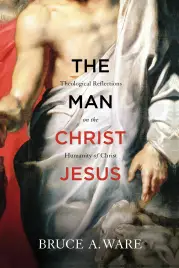Outstanding
The deity of Jesus Christ, a profound doctrine, deserves our utmost attention as we seek to rightly speak of his identity and refute false teaching that has arisen in various religious sects. To speak solely of Christ’s divinity, however, would be to get only half the story correct, for he is both fully divine and human—one person with two natures. Though orthodox churches would happily affirm Christ’s dual natures, the emphasis tends to go in the direction of his deity—especially when referencing Jesus’ miracles and resistance to temptation. If we aren’t careful, we can become guilty of a functional Docetism in which the importance of Jesus’ humanity is diminished and truncated in favor of his deity.
In The Man Christ Jesus, Bruce Ware seeks to correct this kind of thinking, surveying the biblical witness for the veracity of a full–orbed doctrine of Christ’s humanity as well as demonstrating the applicability of this doctrine to our own lives. Referencing 1 Peter 2:21–23 numerous times in this work, Ware contends that if we want to follow in the footsteps of Christ in obedience to God, we must possess a proper understanding of Jesus’ humanity.
Sequential Approach
Ware, professor of Christian theology at Southern Seminary in Louisville, is clear from the outset that the book isn’t intended to be a “complete Christology” (12–13) since he doesn’t reckon with Christ’s deity in any kind of exhaustive detail. His primary focus is instead on Christ’s humanity, specifically in regard to his incarnation, growth in wisdom and faith, Spirit–empowered ministry, ability to resist temptation, life as a man, death in our place, resurrection, present reign, and future return. As such, each of Ware’s chapters builds logically and chronologically throughout the work. Regarding Christ’s humanity he writes:
[While Jesus was fully divine], he lived his life fundamentally as a man, and as such, he relied on the Spirit to provide the power, grace, knowledge, wisdom, direction, and enablement he needed, moment by moment and day by day, to fulfill the mission the Father sent him to accomplish. (34)
Ware’s greatest strength is his ability to ask deeply thought–provoking questions about Christ’s identity. For example, if Jesus was perfectly obedient because he was perfectly God, then in what sense can we, his followers, be called to live like him (31)? How do we make sense of Jesus increasing in wisdom (48) and learning obedience (60)? If Jesus is impeccable since he’s divine, is that how he resisted temptation (73–74)? (For what it’s worth, this chapter is worth the price of the book as Ware offers a compelling theological proposal to a centuries–old debate.) Is there any theological significance to the fact Jesus came and lived as a man and not a woman (91)? Ware deftly answers each of these questions and more by elaborating on biblical and theological (as well as some historical) details regarding the human nature of our Lord Jesus.
In light of heightened controversy over gender roles, Ware’s section on Jesus living as a man has unique theological and practical import. Contesting gender–inclusive language concerning Jesus’ masculinity in such Bible translations as Today’s New International Version (TNIV), Ware offers 12 reasons why “the male gender of Jesus was essential both to the reality of his incarnational identity and to the accomplishment of his incarnational mission” (95). He presents a solid cumulative case from Scripture, noting specifically the nature of the Trinity and Jesus’ role as the second Adam, the seed of Abraham, the Son of David, the Son of God, and the Son of Man. This isn’t mere theological conjecture; Jesus’ identity as a man is rooted in Scripture and has significant implications for how we relate to one another as men and women. Far from inconsequential doctrines, biblical manhood and womanhood are grounded in gospel realities, and Ware’s chapter is a helpful contribution to the discussion.
Couple Questions
While not written as a technical monograph for the academic elite, Ware’s book could have elaborated on a couple points. First, he addresses the issue of Jesus being functionally subordinate to the Father in several places (25, 98) but never delves into the topic in any real detail. Even though the particulars of ontological versus functional subordination may not resonate with the typical layperson, some clarification would have been useful to avoid confusion concerning the Son’s subordination. (This could be done at least by citing several key works on the subject.)
Second, Ware dealt with the thorny issue of Jesus dying as both God and man: “God, as God, cannot die. But God the Son, as man, died indeed” (124). While I understand the divine nature is neither susceptible to sin nor death, this answer still begs the question concerning the three days Jesus was in the tomb. If the hypostatic union entails one person fully possessing a human and a divine nature, then did some kind of division between Christ’s two natures occur at his death until his resurrection? Granted, this question approaches the edges of theological inquiry, as the biblical data are scant in giving a thorough answer, but it would have been useful see some interaction with the issue.
Aside from these minor inquiries, The Man Christ Jesus is an outstanding work about the humanity of Christ. It’s highly accessible, filled with apt illustrations, and consistently useful for application from start to finish. As a student of Ware’s at Southern Seminary, I can personally attest that the passionate and lucid presentation of the truth contained in this work is consistent with his preaching, teaching, and everyday living. Pastors, students, and church members alike would do well to engage with this book—and as a result to better understand their Savior and, by the power of the Spirit, to seek to follow his example.
Jeremy Kimble, Director of the Youth Ministry Institute (review posted on the website of The Gospel


